18 Tips for Succeeding in an Interview
4 MIN READ
02/10/2016 | Career Growth

How to Succeed in an Interview
1. Dress well. When in doubt, always lean towards dressing formally. Not only will this give off a good first impression, but you’ll feel more confident when you come in wearing your best set of clothes.
2. Arrive on time. There’s nothing worse than keeping your interviewer waiting right off the bat. It’s sure to count as a strike against you, if not a boot out the door. Therefore, plan to arrive early (extra early if you know that there’ll be lots of traffic). Make sure to call your recruiter ASAP if you know that you’ll be late.
Pro tip from a MetroStar recruiter: “Don’t show up TOO early (it’s just awkward). 5-10 minutes early is perfect. Any sooner puts undue pressure on the receptionist to find something to occupy you while you’re waiting (or you stare at the receptionist for 30 minutes while waiting for the appropriate time). Go to Starbucks to kill time, or sit in your car and read.”
3. Give an appropriately firm handshake. Be careful not to shake too aggressively or weakly–a weak handshake can signal that you’re disinterested or insecure.
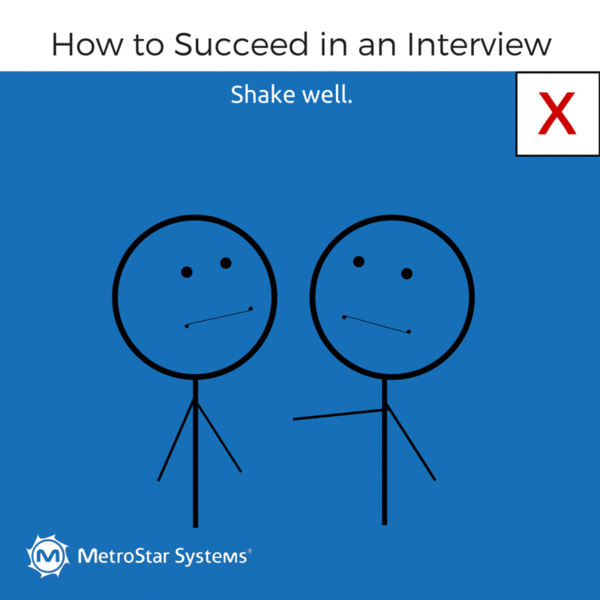
4. Be prepared. Come prepared with well thought-out stories that can be tailored to specific behavioral-based interview questions that you’re asked.
5. Do your research. It seems like common sense, but you MUST do thorough research on the position that you’re applying for. Browse through the LinkedIn profiles of individuals who already have that position. What experiences and skills do they have? Identify similar or related experiences in your background that you can highlight, and practice expressing what makes you stand out without sounding pretentious.
6. Be confident. Make eye contact with your interviewer and practice your voice track before coming in for your interview so that you feel more comfortable with your words.
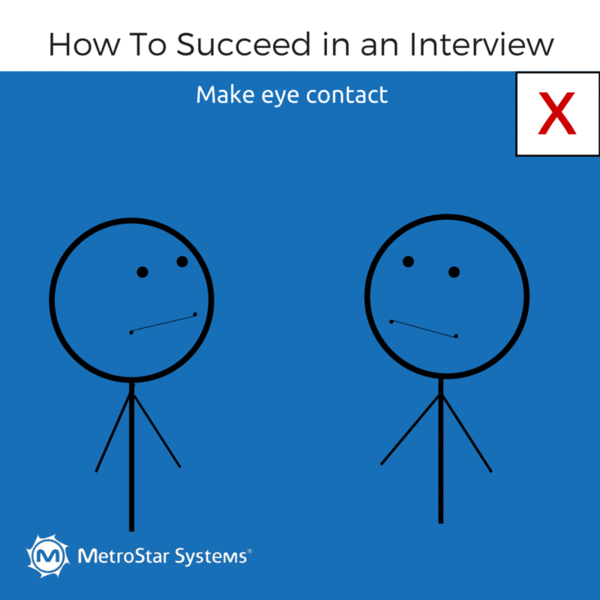
7. Know your role. Be able to articulate what you are looking for in a role (even if it’s not a specific position but something like the opportunity to learn or make an impact on the organization). While an interviewer is assessing whether you’re a good match for the company, you should also be doing the same assessment during the interview. Being able to honestly express what you’re looking for can help both you and your interviewer provide a more accurate assessment.
8. Be an active listener. Don’t let your mind drift off or worry about your next answer while your interviewer is speaking. Be attentive and never interrupt. If you happen to miss hearing a question, politely ask your interviewer to repeat it.
9. Choose your words wisely. Refrain from asking “what?” or referring to your interviewer(s) as “you guys.”
10. Go off or go home. Turn off your cell phone. Don’t allow any chances for interruptions or distractions during your interview.
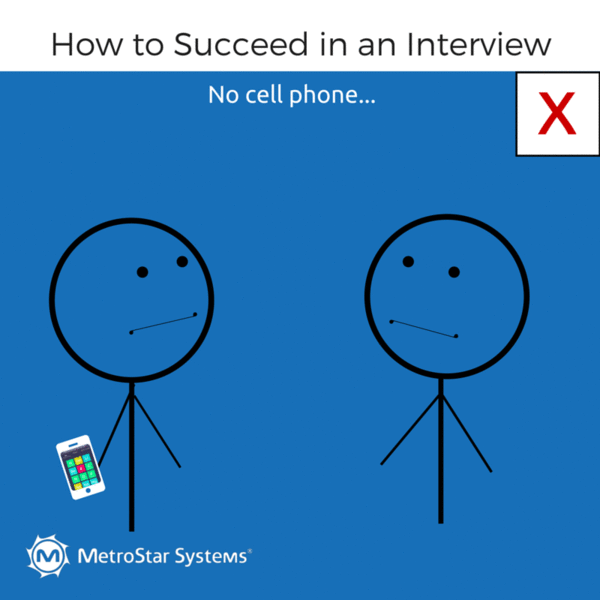
11. Be positive. Speak positively of old employers and/or jobs. Don’t leave your interviewers with a bad taste in their mouths, or with the concern that you’ll one day speak poorly of them too.
12. Be honest. Never, ever lie during an interview. Be transparent about the experiences that you lack, if asked, and recover by expressing an interest to learn more about areas you’re less familiar with.
13. Know the company. Research the company beforehand so that you can impress your interviewer with meaningful questions and/or conversations. LinkedIn, Glassdoor, and Google are great resources for company reviews and background information.
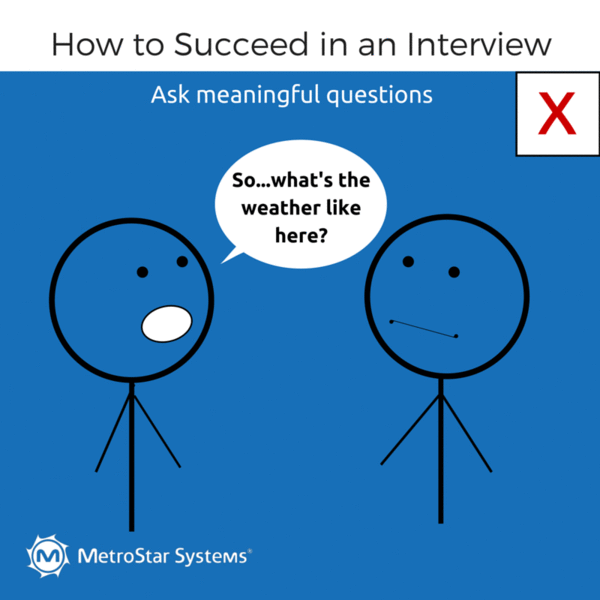
14. Know your number. Don’t bring up salary unless you’re specifically asked about your salary requirements. At the same time, come prepared with an idea of how much someone in your position with your qualifications should expect to receive. Back this with research that you gain both online and by talking to people with experience in your field.
15. Don’t be a dead fish. Smile.
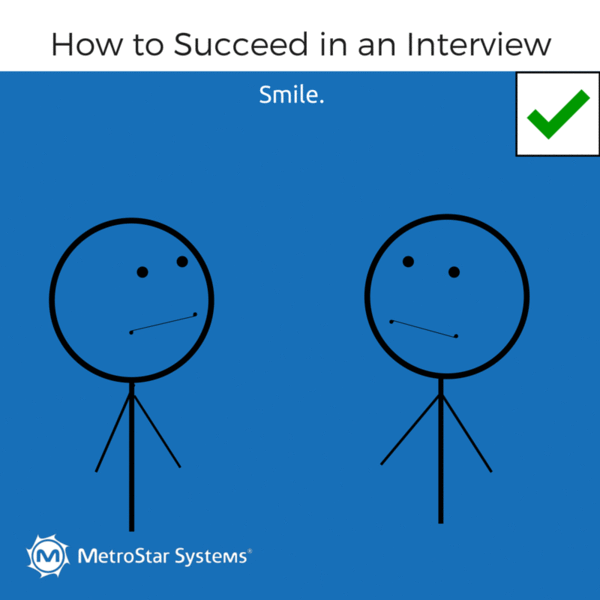
16. Say thank you. After your interview, remember to send a formal, but friendly “thank you” note to your interviewer. Let them know that you appreciated their time and express why you’re still hopeful for the job.
17. Keep networking. You should constantly talk with people both inside and outside of the company that you applied for. Actively seek the best, most honest information about the company that you may potentially join.
18. Stay engaged. Continue engaging in job fairs and other related events where you can glean expertise, sharpen your networking skills, and/or meet someone who can connect you with other professionals in your field.

Written By:
Allison Lee
Former Contributor
you might like these too
MetroStar’s Cedric George Honored for Advancing Readiness, Empowering Veterans, and Delivering Mission-Critical Impact
Career Growth | Management | MetroStar Culture | Making an Impact
Stephanie Haynes Positioning MetroStar as a Federal AI Powerhouse
Career Growth | MetroStar Culture | Making an Impact | AI/ML
Cedric George Is Modernizing Military Logistics at MetroStar
Career Growth | Management | Awards | Making an Impact
want to stay in the loop?
Never miss a thing by signing up for our newsletter. We periodically send out important news, blogs, and other announcements. Don’t worry, we promise not to spam you.
